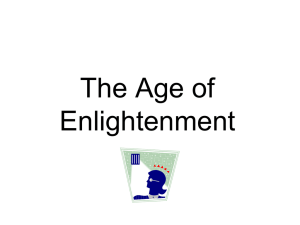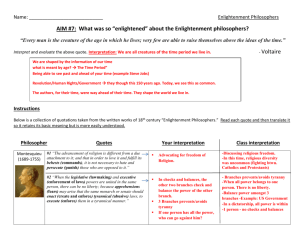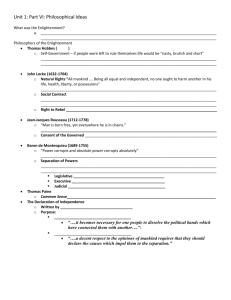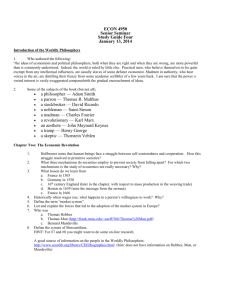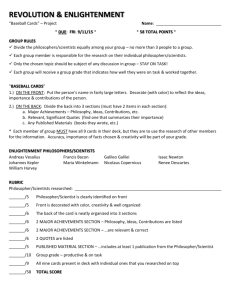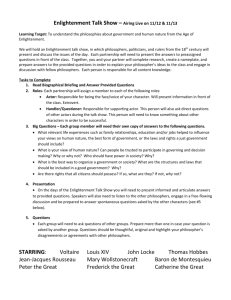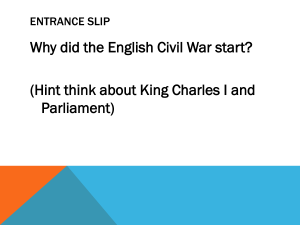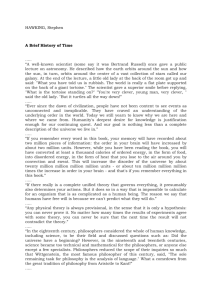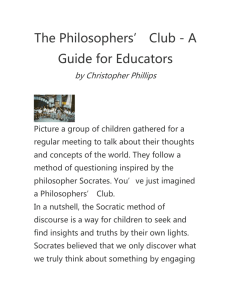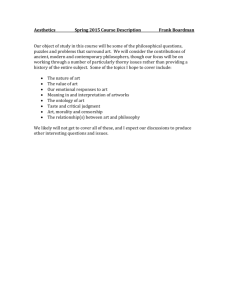about the Enlightenment philosophers?
advertisement
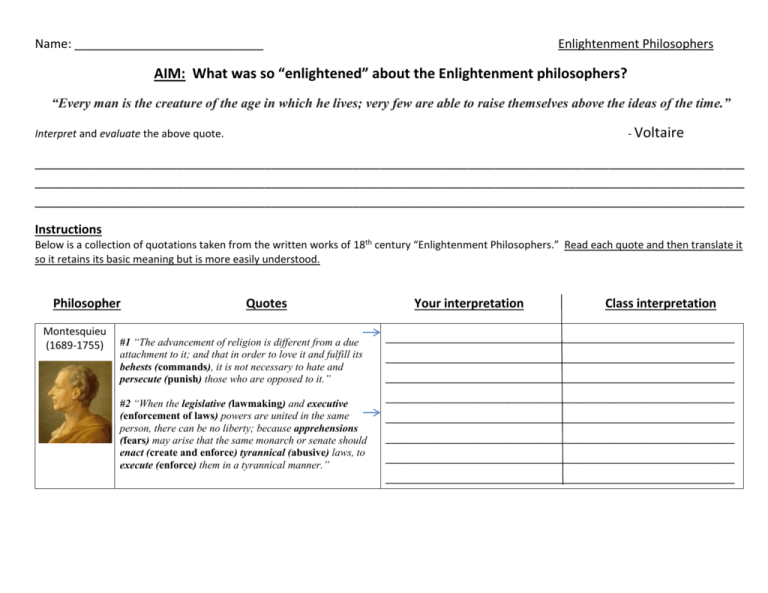
Name: ____________________________ Enlightenment Philosophers AIM: What was so “enlightened” about the Enlightenment philosophers? “Every man is the creature of the age in which he lives; very few are able to raise themselves above the ideas of the time.” - Voltaire Interpret and evaluate the above quote. _________________________________________________________________________________________________________ _________________________________________________________________________________________________________ _________________________________________________________________________________________________________ Instructions Below is a collection of quotations taken from the written works of 18th century “Enlightenment Philosophers.” Read each quote and then translate it so it retains its basic meaning but is more easily understood. Philosopher Montesquieu (1689-1755) Quotes #1 “The advancement of religion is different from a due attachment to it; and that in order to love it and fulfill its behests (commands), it is not necessary to hate and persecute (punish) those who are opposed to it.” #2 “When the legislative (lawmaking) and executive (enforcement of laws) powers are united in the same person, there can be no liberty; because apprehensions (fears) may arise that the same monarch or senate should enact (create and enforce) tyrannical (abusive) laws, to execute (enforce) them in a tyrannical manner.” Your interpretation Class interpretation ________________________________________ ________________________________________ ________________________________________ ________________________________________ ________________________________________ ________________________________________ ________________________________________ ________________________________________ Jean Jacques Rousseau (1712-1778) #1 “The Sovereign (ruler) cannot act save when the people is assembled. Every law the people have not ratified (approved) in person is null and void — is, in fact, not a law. The legislative power belongs to the people, and can belong to it alone.” #2 No man should be put to death, even as an example, if he can be left to live without danger to society.” #3 “…the social state is advantageous to men only when all possess something and none has too much….The greatest enemies of freedom are the extremely rich and the extremely poor because one is willing to buy it and the other is willing to sell it.” Cesare Baccaria (1738-1794) #4 “Thus the whole education of women ought to be relative (connected) to men. To please them, to be useful to them, to make themselves loved and honored by them, to educate them when young, to care for them when grown, to council them, to console them, and to make life agreeable and sweet to them—these are the duties of women at all times, and should be taught to them from their infancy.” #1 “The torture of a criminal, during the course of his trial, is a cruelty consecrated (made holy) by custom in most nations. It is used with an intent … to make him confess his crime…No man can be judged a criminal until he be found guilty; nor can society take from him the public protection, until it have been proved that he has violated the conditions on which it was granted. What right, then, but that of power, can authorize the punishment of a citizen, so long as there remains any doubt of his guilt? This dilemma is frequent. Either he is guilty, or not guilty. If guilty, he should only suffer the punishment ordained (ordered) by the laws, and torture becomes useless, as his confession is unnecessary. If he be not guilty, you torture the innocent; for, in the eye of the law, every man is innocent, whose crime has not been proved.” #2 “Punishment [by] death is deadly to society” ________________________________________ ________________________________________ ________________________________________ ________________________________________ ________________________________________ ________________________________________ ________________________________________ ________________________________________ ________________________________________ ________________________________________ ________________________________________ ________________________________________ ________________________________________ ________________________________________ ________________________________________ ________________________________________ ________________________________________ ________________________________________ ________________________________________ ________________________________________ ________________________________________ ________________________________________ ________________________________________ ________________________________________ Voltaire (1694-1778) #1 “I may disapprove of what you say, but I will defend to the death your right to say it…To announce truths is an infallible (perfect) receipt for being persecuted….It is dangerous to be right when the government is wrong.” #2 “The best government is an Enlightened Despot (fair ruler) tempered (softened) by an occasional assassination. The public is a ferocious beast. One must either chain it up or flee from it.” #3 "We should regard all men as our brothers. What? The Turk my brother? The Chinaman my brother? The Jew? Yes, without doubt; are we not all children of the same father and creatures of the same God?... Tolerance (acceptance of differences) has never brought civil war; intolerance has covered the earth with carnage (destruction). Is each citizen to be permitted to believe and to think that which his reason rightly or wrongly dictates? He should indeed, provided that he does not disturb the public order; if it is a crime not to believe in the dominant religion, you accuse then yourself, the first Christians, your ancestors, and you justify (proved correct) those whom you accuse of having martyred (killed) them. …Christianity is without a doubt the most ridiculous, the most absurd, and the most bloody religion to ever infect the world." Mary Wollstonecraft (1759-1797) #1 The divine right of husbands, like the divine right of kings, may, it is hoped, in this enlightened age, be contested (challenged) without danger. #2 Women ought to have representatives, instead of being arbitrarily (randomly) governed without any direct share allowed them in the deliberations (debates) of government. #3 Women are systematically degraded (disrespected) by receiving the trivial (meaningless) attentions which men think it manly to pay to the sex, when in fact, men are insultingly supporting their own superiority. ________________________________________ ________________________________________ ________________________________________ ________________________________________ ________________________________________ ________________________________________ ________________________________________ ________________________________________ ________________________________________ ________________________________________ ________________________________________ ________________________________________ ________________________________________ ________________________________________ ________________________________________ ________________________________________ ________________________________________ ________________________________________ ________________________________________ ________________________________________ ________________________________________ 1. Specifically citing philosophers and their ideas, identify common overarching ideas or themes among these thinkers. _________________________________________________________________________________________________________ _________________________________________________________________________________________________________ _________________________________________________________________________________________________________ _________________________________________________________________________________________________________ 2. Specifically citing philosophers and their ideas, identify one contradiction (opposing idea) amongst the philosophers. With which of the opposing views do you agree more? Why? _________________________________________________________________________________________________________ _________________________________________________________________________________________________________ _________________________________________________________________________________________________________ _________________________________________________________________________________________________________ _________________________________________________________________________________________________________ _________________________________________________________________________________________________________ 3. Select two of the Enlightenment philosophers and evaluate if their ideas are beneficial or harmful to a society. (Remember an evaluation requires supporting details and/or argumentation) _________________________________________________________________________________________________________ _________________________________________________________________________________________________________ _________________________________________________________________________________________________________ _________________________________________________________________________________________________________ _________________________________________________________________________________________________________ 4. Of the five philosophers quoted, who do you feel was most “enlightened” for their time? Why? Are there any “Enlightenment” philosophers who you feel shouldn’t be considered “enlightened?” _________________________________________________________________________________________________________ _________________________________________________________________________________________________________ _________________________________________________________________________________________________________ _________________________________________________________________________________________________________
